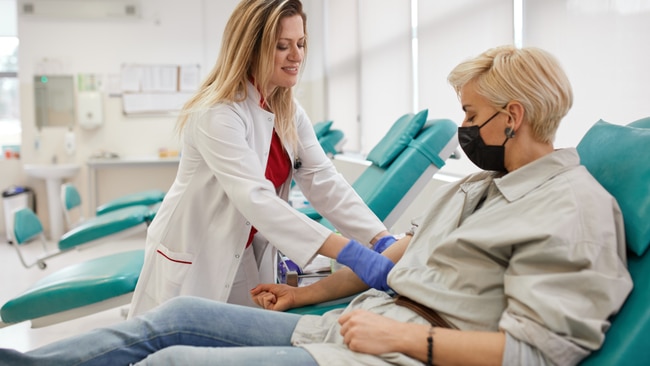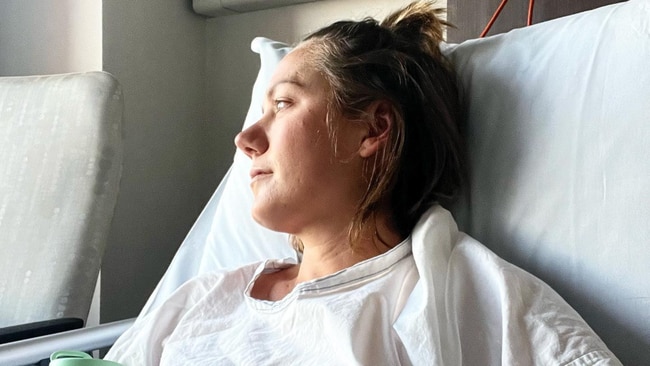'I was diagnosed with breast cancer in my 20s, this is why we need to talk about it’
Early detection has 100 per cent survival rate

Cancer
Don't miss out on the headlines from Cancer. Followed categories will be added to My News.
Breast cancer is the most commonly diagnosed cancer amongst women in Australia. Here, Body+Soul speaks with Martine Dimes, who was diagnosed with breast cancer and the BRCA2 gene at just 29 years old.
“It’s not good news, it’s cancer” are the words no one wants to hear.
In fact, there’s not a lot that’s scarier than finding out that you’re sick, at the mercy of a disease you have no power over, and no foresight of, or easy way to recover from.
If you were to envisage hearing those words, you’d likely imagine yourself in midlife, with a family, a job – a life that’s firmly in the middle of its journey. But what if you heard them far earlier? Like, say, in your mid-20s, or your early 30s, when you’ve hardly even got started yet. '
That’s the fate that befall Martine Dines; at just 29 years old, having just moved to Australia from Ireland with her fiancé, her life came crashing down around her. She was diagnosed with breast cancer, prognosis undetermined, and her life transformed from one of endless hope and opportunity, to one filled with fear, and uncertainty.
Like what you see? Sign up to our bodyandsoul.com.au newsletter for more stories like this.
Dines also found out that she has a mutated BRCA2 gene – which instead of producing proteins to help repair damaged DNA like they’re meant to, means the person is 60 to 70 per cent likely to develop breast, ovarian and other cancers.
There’s not much scarier than hearing you have a potentially fatal disease. But getting that news when you’re young and out of the theoretical risk category is another kind of pain altogether.
“It is so hard not to hate your body when you feel like it has failed you all over again,” Dines wrote in an Instagram caption in May, after being readmitted to hospital to deal with complications from her cancer.
She’s not alone: 3 women under the age of 40 are diagnosed with breast cancer every single day in Australia, and it’s “the most commonly diagnosed cancer amongst women in Australia,” Associate Professor Cleola Anderiesz who is also the CEO of the National Breast Cancer Foundation (NBCF), tells Body+Soul. “This year alone, more than 20,000 Australians will be diagnosed with breast cancer and sadly we will lose 3,200 people from this disease.”
Two years after the start of her fight against breast cancer, Dimes sat down with Body+Soul to share insight into her experience with the disease at such a young age, what she wishes people knew about breast cancer, and the one thing that can make all the difference.
Body+Soul: What has your journey with breast cancer looked like over the past two years?
Martine Dimes: I was diagnosed on 5th June 2021 and it was the scariest time of my life. I was only 29 and thought I was going to die.
When my GP brought me into her room with my fiancé I had an out-of-body experience when she said, ‘It‘s not good news, it’s cancer’. I saw my whole life flash in front of me, and I immediately felt like a burden, a problem, an issue for everyone, a heartache. I wanted the ground to literally swallow me up and take me away from the chaos that was about to unfold.
I broke down in tears, screaming. My partner was trying to hold me while also digesting the news that the woman he is due to marry has a life-threatening illness and no one knows what the next two weeks will look like, never mind the rest of our lives.
It was one of the hardest moments in my life…I just wanted to fall into the arms of my parents. I have never felt so far away in my whole entire life. But my friends in Australia became my family here, crowding around me and keeping my spirits high while also wiping away my tears.
Everything started to move very quickly after my first appointment. 4 days later I went to my first appointment at the breast clinic and I was booked to have my first surgery only 10 days later – a right-side mastectomy and reconstruction
Soon after my surgery, pathology results showed the cancer had spread to my lymph nodes and I needed more surgery to remove tissue and cancer from under my arm. My confidence and hope were shattered at this point. I knew this wasn’t a good thing and it had changed my prognosis and treatment plan.

After three weeks of sleepless nights, we got an email confirming my parents were exempt [from Covid border restrictions] and had permission to enter Australia based on my needs and current situation. Nine weeks after my diagnosis, I could finally hug my parents outside their quarantine hotel and for the first time, I felt like the world was finally on my side.
I went on to have five months of intense chemotherapy. I was extremely sick; I lost all my hair, I was tired, emotional, and felt like I lost my identity and independence. But after a good cry, I booked myself in to talk to someone, put on my wig, added some colour to my cheeks and got out of pyjamas. I started to feel a tiny bit better.
Those 5 months were intense. I didn’t know what each day was going to look like and I had to take one day at a time. But it was all worth it to hear the words “All clear” from a PET scan. After the chemotherapy I was cancer-free. I will never forget that moment: standing on a boat ramp with Sean and my parents. The sun was shining, we all hugged and cried happy tears for once.
I went on to have six weeks of daily radiotherapy, after the BRCA2 gene discovery, which meant I had a left side Mastectomy and reconstruction, too.
I never asked my doctors what my full diagnosis was – I was happy when they told me it was early and they were treating me to cure me. I think it kept me sane.
B+S: What was it like finding out you had the BRCA2 gene?
MD: This was a hard pill to swallow as I knew one of my parents had to have the gene, so my sisters and nieces were at high risk of also having the gene.
After testing, my mother and young sister (25yo) found out they have the gene. They are back in Ireland waiting to have preventative surgery. They are grateful that they discovered the gene before anything turned cancerous, but sorry that I had to go through my journey.
However, we know that information is key and they can have the surgery which reduces their risk from 60 to 70 per cent to 2 per cent, which is lower than a woman without a gene fault.
B+S: What was it like being diagnosed with cancer in your 20s?
MD: It was extremely hard. I was planning on marriage and babies, and Sean and I had cancelled two weddings due to lockdowns and Covid. This was hard enough without throwing a cancer diagnosis into the middle.
I have always been strong mentally and physically, but nothing prepares you for cancer. I started seeing a kinesiologist, counsellor and a psychologist – I had never been to therapy before and after going myself and learning about trauma, I feel like everyone can benefit from it.
I have always had a positive outlook on life and I think this has stood by me. I started to journal every single day from the day I was diagnosed. I started meditating, using breath work to calm me and I looked for gratitude every single day. Even when I couldn’t lift my head – I found gratitude.
I soon started to recognise activities or triggers that impacted my mental health and made changes. I knew for example that I was extremely stressed and agitated the day before chemotherapy. So I did things that brought me joy and kept my mind occupied. Then every morning before chemotherapy, I started my morning off with a sunrise, meditation and breathwork.
I prioritise my mental health just as much as physical health. I learnt that most people (including me a few years back) don’t see both as equal. It is usually much easier to see physical health however if you let your mental health deteriorate or go undetected, the recovery is often much harder and longer.
B+S: How can early detection change the reality for people with breast cancer, especially those diagnosed when they're young?
MD: Early detection has a 100 per cent survival rate. I think this statement speaks for itself.
If you find a lump, discharge, dimples, inverted nipples, rash or pain, go straight to the GP and have it checked. It can be the difference between treating for a cure or treating to control cancer.
I hate to think what would have happened to me had I not gone to the GP the day I did. Use that fear to make yourself go to the doctor.
B+S: What do you wish people knew about breast cancer?
MD: Breast cancer, like any cancer, does not discriminate.
It doesn’t matter how healthy you are, how old you are, how you choose to spend your day… cancer can come knocking on anyone’s door but if you catch it early, then your chances of being cured are high. Treatment isn’t all rainbows and teddy bears, but it will save your life, and that’s worth it.
The NBCF is an incredible charity. In the last 20 years they’ve funded around $200 million into world-class research projects across Australia, reducing death rates by 43 per cent, in part due to research into prevention, early detection, and new and improved breast cancer treatments.
However, the work isn’t done yet and the NBCF are working towards a vision of zero deaths from breast cancer – I’m very proud to be a community ambassador.
Originally published as 'I was diagnosed with breast cancer in my 20s, this is why we need to talk about it’



